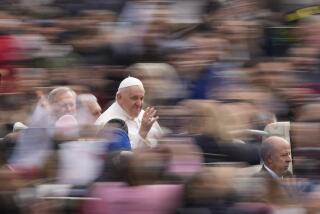Music may warm Sino-Vatican ties
- Share via
SHANGHAI — When the China Philharmonic Orchestra performs for Pope Benedict XVI at the Vatican next week, it will start with Mozart’s religiously inspired Requiem and end with a popular Chinese folk song called “Jasmine Flower.”
The concert Wednesday is a historic gesture that may help improve relations between the Vatican and Beijing, a major goal for this pope as he seeks to expand freedoms for Roman Catholics in China.
The Beijing-based orchestra, along with the Shanghai Opera House Chorus, will perform for the pope at Paul VI Audience Hall, the Vatican’s principal auditorium. Although the orchestra played in Rome in 2004, this will be its first appearance at the Vatican.
“I certainly feel very excited,” China Philharmonic’s music director, Long Yu, said in a telephone interview from Beijing.
Vatican Radio, which first reported the concert, said, “Music is confirming its role as a language and most precious medium for dialogue among peoples and cultures.”
Vatican sources said the initiative for the concert came from the Chinese.
In February, the New York Philharmonic gave an unprecedented performance in the North Korean capital of Pyongyang, though the reclusive nation’s leader, Kim Jong Il, did not attend.
It wasn’t clear how much next week’s concert would help the Vatican and Beijing move toward reconciliation.
At the very least, the China Philharmonic’s debut at the Vatican, part of a three-city European tour that begins Sunday, would carry significant symbolism for the millions of Catholics in China, who are split between official and underground churches. Chinese Catholics are allowed to worship only at state-backed churches, and many worshiping at clandestine sites and professing loyalty to the pope have been persecuted.
The Chinese orchestra is under the control of the officially atheist central government, which has had icy relations with the Vatican since the breakdown of diplomatic ties two years after the 1949 communist takeover in China.
Although Beijing has recognized the pope as the Catholic Church’s spiritual leader, it has repeatedly clashed with Rome over the authority to appoint priests and bishops in China, as well as the Vatican’s diplomatic relations with Taiwan.
Since his election as pope three years ago, Benedict has sought “constructive” dialogue with Beijing aimed at normalizing relations and has urged unity among all Catholics in China.
Yet he has also taken steps that undoubtedly rankled the Chinese government. The first batch of bishops that Benedict elevated to cardinal included the outspoken archbishop of Hong Kong, Joseph Zen.
The pope invited Zen to pen the meditations for this year’s Easter celebrations, where “living martyrs” were honored, and he has condemned the “suffering” of the people of Tibet.
At the same time, the Vatican and Beijing have quietly agreed on the appointment of some Chinese bishops.
“If it’s true that the China Philharmonic is performing at the Vatican, it is a great example that the two sides are moving forward through an exchange of culture and arts,” said Liu Bainian, vice chairman of the Chinese Catholic Patriotic Assn., which represents more than 6,000 official churches and 5.6 million Catholics.
Plans for the performance apparently came together fairly quickly.
“Like the pingpong diplomacy, it’s very short notice,” said Yu, 44, the orchestra’s Shanghai-born and German-trained director. He was alluding to the cultural exchange of table tennis players between the U.S. and China in the 1970s that helped lead to restoration of relations between the two countries.
He said that what helped pave the way was a performance of the Requiem on April 8 at St. Ignatius Cathedral in Shanghai. More than 1,000 people, including some high-level Beijing officials, were said to have attended that event.
“That opened up this kind of territory,” Yu said, adding that such a concert provides a common vehicle for promoting dialogue and peace.
And besides, the pope is a big Mozart fan.
--
Times staff writer Tracy Wilkinson in Rome contributed to this report.
More to Read
Sign up for Essential California
The most important California stories and recommendations in your inbox every morning.
You may occasionally receive promotional content from the Los Angeles Times.














